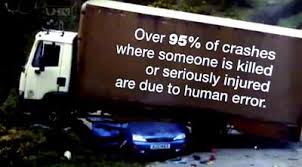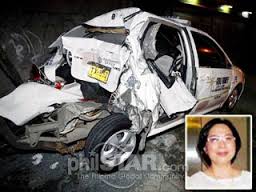
VERA Files, a group I’m part of (we produce in-depth stories on subjects that matter) will be conducting a training for journalists on Road Safety.
Following is VERA Files’ announcement of the Road Safety Journalism Fellowship:
Road crashes are among the leading causes of death in the Philippines.
The 2015 World Health Organization’s Global Status Report on Road Safety estimates 10,379 fatalities in the country a year, half of them motorcycle riders, followed by pedestrians.
Stories of road crashes that kill, injure and permanently disable people are regular fare in newspapers and in radio and television broadcasts. They grab the public’s attention and prompt authorities into action, especially in cases involving big numbers of fatalities or public figures. But in no time, the stories are forgotten, leaving the public with little or no learnings. And the cycle of routine reporting goes on. Road safety becomes a casualty yet again.
The World Health Organization, in collaboration with the Department of Transportation and Communication (DOTC) and in partnership with VERA Files, is launching the Road Safety Journalism Fellowship to raise public awareness of road safety and promote policy and behavioral changes that will reduce and prevent road crashes.
The Fellowship aims to strengthen the capacity of journalists to produce comprehensive news and feature articles and translate statistics on road injuries and deaths to human and public interest stories. The Program aims to generate interest in road safety reportage that is thorough, exhaustive and contextualized; one that goes beyond breaking news, body counts and police reports but which instead frames road safety as a public health and development issue.

The Program aims to engage journalists in the advocacy and promote the goals of the UN Decade of Road Action for Road Safety to stabilize and reduce by 50 percent road deaths by 2020.
Mechanics
We are calling for story proposals that will push road safety as an agenda and a shared responsibility of everyone in the community – policy-makers and law enforcers, road builders, vehicle manufacturers, motorists, the riding public, pedestrians and the public in general.
Fellows will produce a minimum of five well-researched stories/video productions that will be published in their own news organizations.
Story ideas can be developed from the following subjects, relating to major risk factors that influence the likelihood of a crash and the severity of its consequences: (1) speed; (2) use of seatbelts: (3) child restraint; (4) helmets for motorcycle riders; and (5) alcohol or drunk driving.
Stories can provide an in-depth analysis of data, behaviors, and impact of these risk factors and the presence (or absence) of policy and legislative-related actions and their impact and status and nature of implementation and enforcement. Other topics of emerging importance such as distracted driving and pedestrian safety may also be tackled.
The Fellowship will open with an Orientation/Training Seminar in March. The Fellows will participate in a Roundtable on Road Safety involving editors and other journalists in June.
Who can apply?

Journalists with at least three years of reporting experience are invited to submit three story proposals (each story idea explained in 150-200 words) they wish to work on for the duration of the Fellowship.
The professional qualifications of the applicants will be taken into consideration in the selection, but the quality and substance of the story proposals will be given greater weight.
How to apply
Applicants are to send in their updated CVs (no more than two pages), two samples of published articles/video clips, a letter of endorsement from an editor or producer, and a completed application form to roadsafety@verafiles.org or roadsafetyph@gmail.com.
VERA Files is also accepting online applications.
Deadline: January 31, 2016
For more information please visit http://verafiles.org/apply-now-road-safety-journalism-fellowship/
Also there is a need to look at the Skill and Safety training of drivers before they are given the privilege to operate motor vehicles…once the driver is trained properly, he will be driving in proper speed according to the weather and road condition, know how to buckle up right and to properly restraint a child in the child seat…
Ellen, in regards to motorcycle training, it should be taken over by professionals motorcycle riders themselves preferably in a formal School setting…accredited by the Transport Authority…it will emphasize more on safety and rules of the road…gone thru with it in a Community college and it is superb program..once you gone thru the course, and passed its roadtesting, the ministry will issue the specific Motorcycle license to operate a motorcycle…of any size…and in any roadway..
i strongly agree with vic’s framing that drivers (would-be, and existing) must be trained first before “… given the privilege to operate motor vehicles”.
privilege shall be emphasized as against inherent right. a privilege that can be revoked if it runs counter to public good.
but if i were to write a commentary on road safety Phil. setting, my writing will tackle and put emphasis on merit/demerit point system in issuance of drivers license and call for review of penalties.
case in point: incorrigible erring drivers are lumped together with safety conscious ones in their yearly renewals. there is no existing stimuli for errant driver to mend ways. i suggest an adoption of 3 way type of license renewal; yearly for poor driving attitudes and newbies, every 3rd year renewal for satisfactory performance, and every 5th year renewal for excellent performance.
this one-small step certainly may help alter attitudes towards safety — as there is an economic reward attached. obviously yearly renewals is not only cumbersome but hurtful to one’s pocket.
btw, if i may add, my second country regulators imposes a rather stiff penalty for DUI. at even today’s depressed exchange rates a fine of PhP 370,000 is imposed for a mere presence of alcohol in the system.
In a country where even blind people can acquire driving licenses, the regulatory side of the equation needs much more emphasis than the others listed.
I recall in 2013 when I failed the license exam – just because I was the only one who did not pay their fixers. I was given a test paper (all test papers are unique – each with a different set of questions) that concentrated on road signs and printed with black laser. I knew the moment I got the questionnaire, it was designed to make me fail.
Lo and behold, even the stupid jologs who can’t even write their own names or read the questionnaires all passed.
Aside from this, vehicle roadworthiness and documentary authenticity inspections, drug testing, the system of penalties, method of issuance of citation tickets and traffic management all need to be revamped.
These will greatly reduce the number of unsafe vehicles, driving morons and corrupt officers who contribute more to the traffic than mere vehicle volume.
Tongue, this was just two years ago.
LTO, LTFRB and HPG are our partners also in this program. I’ll mention this experience of yours to them.
Teka, di lang pala ako ang bumagsak, naalala ko may isang pulis na naka-motor, nag-test din at sumablay kasi di din nag-fixer. Pulis, e! Galit na galit yung superior niya nung dumating, sigurado naayos din yun nung araw na yun. Motorcycle cop bumagsak sa driving exam.
Anyways, 2 years akong di nag-drive dahil nga sa stroke at heart operation ko kaya nag-expire lisensiya ko, I had to pass thru student – tapos non-pro ulit. I made sure the next year, kahit kontra sa prinsipyo ko, naglagay na rin ako.
———-
Ellen, garapalan sa exam room. May mga “substitute” na kumukuha ng test para sa mga naglagay, dun pa sila nakaupo sa desk ng proctor. Ang score ko nga pala ay 28 out of 40. 30 ang passing. Pinaringgan pa ako ng proctor, “Sayang, baka pwede pang mahabol, 2 na lang ang kulang”. Alam ko na ibig sabihin nun. E, ayaw ko talaga maglagay. Umuwi na lang ako. Paguwi ko feeling ko napakatanga ko na.
Tongue, mixed emotions ramdam ko tapos mabasa karanasan mo.
Masaya dahil may lisensya ka na muli. Malungkot dahil pinagbigyan mo sila. Walang panghusga dahil kung ako sa nasa lugar mo, baka ganun din gawin ko kung wala ng option lalo na kung democratize ang corruption and the act of defying corrupt ways is seen as strange and out-of-touch.
Kaso meron akong alternatives. Kaya gawa ko, pag andiyan ako 3~4 beses kada taon, gamit ko ang second country lisensya, na pwede din naman ayon sa LTO.
@ Ellen,
napansin ko ang mga road barriers erected along main thoroughfares of Metro Manila at ang pinagkaiba nito sa ibang bansa.
when there’s no civil warfare, ang mga barriers are meant to be corrective not life-threatening. ang nandiyan sa Metro is meaning to kill for those who erred. those barrier boulders is not only unpleasant sight wanting of aesthetics but grim mirrors of death and strife.
Tongue…sometimes in early 2000, I purchased a 1200 Yamaha Virago (can drive motorcycle with restriction on training licence) confident that I could hurdle the Motorcycle Course given by the Centennial College…but even during the course, mostly safety maneuvering, my instructor observed that I have issues on my Balance…he Failed me on my roadtest…and told me to check with my Physician..my physician referred me to the Neurologist and he found out that indeed I have some Lessions on the left side of my Brains that could cause partial of full seizures and He immediately advised the Ministry to Suspend my Driver License until he give the Clearance..it took about 16 months when he gave the go ahead but have to Follow up for the rest of my life to keep my License…I have to sell my Bike for a lose since I have no longer interest in getting a Bike license…and every 6 months have to see a neurologist for a follow up…although my original neu long retired…
Freewheel, Every Holiday season..the COPS infringed on our Legal Rights not to be subjected to “unreasonable Search” (justified limits that passed the court challenge) by setting up check points for it RIDE program (Reduce Impaired Driving everwhere) it is non intruding stops but just observe and “sniff” if the driver is under the influence and may employ roadside Breathalyzer and if all seems ok, the officer will usually give out something useful to the driver, like coupons, windshield scrapers and or washers…and anything illegal contents found in the car during the stop is ignored and can not be used for any other proceedings..the court would not admit it since it was not the objective of the ‘infringement’ of the right…